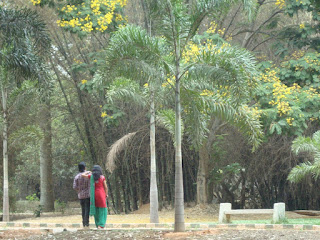My father, J R Lakshmana Rao, wrote a book called ವಿಜ್ಞಾನಿಗಳೊಡನೆ ರಸನಿಮಿಷಗಳು (vijnAnigaLoDane rasanimiSagalu) - a collection of humorous anecdotes involving scientists. It was a great success and saw at least seven reprints.
At my father's suggestion, I have translated that book and here is a sample of three incidents.
Mr. Ramamurthy, the great cartoonist famous through his Mr. Citizen cartoons for the Deccan Herald created brilliant cartoons as illustrations for the book.
The way it came about itself is interesting. A friend of my father, who knew Mr. Murthy, requested him to provide the illustrations. Like the true artist that he was, he had to be coaxed and finally agreed to provide some ten illustrations. He had to be provided the pictures of some of the lesser well known (to him) scientists so that he could draw using them as reference.
The anecdotes apparently caught his fancy and he ended up doing 52 cartoons that enhanced the book immensely!
I am looking for a publisher to take up the publication of the English version. Anyone interested may please contact me. Suggestions are welcome too!

The Boy who Would not Let Read
If you are asked to name the three greatest mathematicians of all times, it is difficult to leave out the name of Karl Friedrich Gauss, the German mathematician, physicist and astronomer who lived during the seventeenth and eighteenth centuries.
As a professor at Göttingen for many years, he brought name and fame to the university. His mathematical acumen was recognised from his childhood. He was a child prodigy.
Gauss’ father was an assistant to a civil contractor. He had the habit of sitting in the courtyard of his house and doing all his paper work. He was sitting there one payday and was paying the labourers their weekly wages. He called out the name and mentioned the wage paid to each labourer. Then he noted it down in a ledger. After every one was paid, he totalled up the wages. He read out the numbers aloud while he did so. When he finished the list and wrote down the total, Gauss who was playing in the yard said, “Your total is wrong. It falls short by eighty-three Marks.” The surprised father did the addition again and found that the child was right. Gauss was just a toddler of three at that time.
A few years later the boy started
going to school. One day the teacher was in no mood to teach but could not let
the students off. He hit upon an idea to keep the students busy. He asked the
boys to write down all the numbers from1 to 200 and add them up. He was sure
that this would keep them busy for quite some time. He then settled down to
read a novel, sure of an hour of peace and quiet. To make sure, he added, “No
mistakes! Once you are finished, check it all again.”
He had not read even half a page
when Gauss stood up and said, “Sir, the answer is 20,100”, and the answer was
right. The teacher, in shock, asked, “How did you do it so fast?”
Gauss said, “I used the formula”: (n × (n +1)) ÷ 2
=
(200 × (200 +1)) ÷ 2
=
20100
“Who taught you the formula?”,
wailed the teacher.
“I arrived at it myself”, said the
boy.
“When?!”
“Just now”, said the little imp.
Ah! That Elusive Word
. . . .

A student of Norbert Wiener, the
renowned mathematician and father of Cybernetics, had great admiration for him.
But, he had not had an opportunity to talk to him. One morning, when the
student went to the Post Office, Wiener was there. He was looking intently at a
sheet of paper on the desk. The student, being an ardent admirer, saw immense
concentration in that look. He did not know if he could talk to him. Wiener
suddenly left the paper, walked to the opposite wall, stood there for a moment
and returned to the paper and started staring at it again. The admirer still
did not know if he could talk to him. Wiener left the paper again but, this time,
walked directly towards the admiring student. Now he had to, at least, greet
him. He did. “Good morning Professor Wiener”, he said. A smile broke out on the
face that was so serious until then. He stopped, stared at the student for a
moment. He then slapped hisforehead and exclaimed, “Ah! It is Wiener. Isn’t
it? I just could not recall that elusive word, however hard I tried. Thanks!”
He now returned to the paper and continued filling the form.
Different
points of view
When the first experimental nuclear explosion was carried out in a desert in New Mexico, all the scientists and
officials connected with the atomic bomb project had gathered in a safe place,
a good distance away from the explosion site, to witness the test. Both Leslie
Groves, a two star general, who was the military director of the project and
Robert Oppenheimer, the scientific director of the project, were there.
A newspaper reporter, awed by the
explosion, asked Oppenheimer, “What did you see?” A perturbed Oppenheimer
replied, “….the end of the world”.
The reporter asked the two star
general the same question. “The third star”, was the prompt reply.
Not a
Question, a Statement
Paul Dirac was notorious for his extreme taciturnity. Once he gave a talk in an American university. At the end of the talk, the
chairman invited questions from the audience. Someone got up and said, “I did
not understand such and such in your talk” and sat down. Dirac sat comfortably
without saying anything. Everyone was curious and after sometime even
uncomfortable. The chairman asked rather hesitantly, “Prof. Dirac, could you
please answer that question?”
“That was not a question but, a statement of
fact” replied Dirac nonchalantly.


































